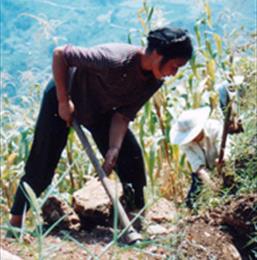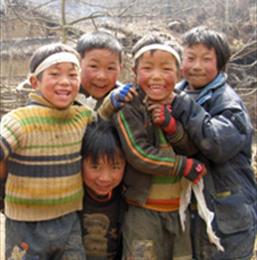Apr / June 2019No. 146
30th June 2019

Cooperative capacity building

Visiting Yingjing County Project Site

Sow breeding technical training

Pianma youth income-generating project training
Project Progress
Marketing Project in Pianma Town, Hanyuan county
Walnut management
In May 2019, DORS established technical service teams that served for their villages that covered six villages in Pingma Town. They were invited to conduct a technical seminar on walnut management in Wanping Village. During the workshop, the Jianping Cooperative Technical Service Team shared the work that they accomplished as well as the achievements of the walnut management in 2019. The representatives of villages in the group discussion also summarized what has been done and the current problems on the walnut management since winter management, In the end, everyone present in the seminar discussed and formulated the "Walnut Management Technical Guide" that is appropriate for Pianma Town. DORS will support the village technical service teams to provide one-year training and guidance on walnut management for the walnut farmers and provide the equipment needed for walnut management and maintenance, especially for active cooperatives. We expect that people can realize the importance of periodic management of walnut planting through this project, so the participants can manage the walnut planting and are willing to do it according to the technical indicators that they learned from the training. Therefore, they can produce high-quality walnuts that can meet the demands of the market.
 Trademark registration
Trademark registration
Cooperative capacity building
——Meeting of Industrial Development Strategies for Jianping Cooperative
In April 2019, DORS invited Wang Zhiwei, chairman of the Pingyang Huangguogan Cooperative in Shimian County, to put forward suggestions for the industrial development of the cooperative based on the status quo of the Jianping cooperative. From the perspective of the development trend of the walnut industry at the national level, he analysed both the advantages and disadvantages of the cooperative. He also summarised how to develop the walnut industry, how to increase the added value of the industry.

At the same time, the new work plan of cooperative was discussed. Additionally, the positive and effective work in technical guidance of the cooperative technical service teams was confirmed (see picture above on the left). After the meeting, the technical director Li Guoqiang also taught the cooperative members the spring bud technique in the walnut forest (see the picture above right).
Cooperative capacity building
—— Jianping Cooperatives Semi-annual Summary Meeting
In May 2019, a meeting was held to discuss the "organizational capacity improvement of the management teams of the cooperatives", in accordance with the stage-goal of the development of them. This was from the perspective of a closer relationship between cooperatives, their members and the community. Members of the community need to be aware of "financial organization of the cooperative", "the significance of unified standardization of technology for production" and "the concept of a new model for the development as a group". This will promote effective operation of the management team, and create a pleasant atmosphere for the next stage in the development of the cooperative.
In addition, the Jianping Cooperative organized a summary meeting of the work for the past six months under the guidance of consultant Wang Zhiwei. The event also organized activities such as the traditional dance of Yi minority, tug-of-war competition, 3-leg races, and competition of planting technology, which is conducted by means of questions and answers. It not only activated the participation of participants but also improved the understanding of planting technology knowledge as well as practical application capabilities. The activity was remarkable because it not only enhanced the ability of the cooperatives to coordinate the overall situation and cooperated in carrying out the work, but also provided for the meeting organizers with the opportunity to organize the practical events, at the same time giving the members the opportunity to participate in the activities. Furthermore, the communication meeting also has created a positive impression for the community members and has linked the residents and the cooperatives more closely. Moreover, it also enhanced the harmony of the community as well. DORS used the platform of the Jianping Cooperative to hold a half-year work summary meeting. Five heads of cooperatives with potential in Pingma Town were invited to the conference. The expectation is to improve their participation in the activities. So they have more interest and confidence to carry out the activities in their cooperative.

Sustainable Livelihood Project in Siguojue Village and Machang Village
Visiting comprehensive income-generating projects and women's capacity-building projects
In June, we invited the representative of the Yi women in Siguojue Village of Lianghekou Town, Xingde County, Liangshan Prefecture, and Machang Village of Guangming Town, to visit the project sites of DORS in Hanyuan County and Yingjing County. Capacity-Building training is also conducted alongside.( Figure 1). The expectation of the activity is to broaden the horizons of visitors and inspire the ideas of income-generating projects, also to improve their self-confidence, and their ability to express themselves and enhance their skills in organisation and co-ordination. So, women‘s participation in collective affairs can be improved through it.
The process is filled with spirit games that can mobilize everyone‘s active participation. Each person can learn and share their knowledge and experience in a relaxed and pleasant atmosphere, and it greatly helps the women to recognise the work the men do. Additionally, we visited the surrounding area and breeding environment of the farmers’ houses in Tazishan (see Figure 2). At the same time, those taking part exchanged ideas on how to improve their lives through income-generating projects, especially on how to make an effort in the hard conditions for the landless people who still do everything possible to improve their life. The women of Xide said that their conditions are better than them, ‘therefore when we go back home, we should do a good job in our environmental sanitation and manage our land well’. After we visited the Daying Village of the Pianma Yi Village in Hanyuan County, the villagers were very hospitable, and the folk customs were very traditional. When the local villagers took out beers and welcomed us, our staff were very moved, and everyone picked up the wine bottle and sang a toast song (see Figure 3). The team members said that it was worthwhile to visit there, and everyone had a smile on their faces (see. Figure 4). At the final summary meeting, they said that the Daying Village is so far away from the downtown, but the sanitation is so good. Not only the sanitation of the households is good, but the general sanitation of the whole village is particularly good. The arable land in the village is fully used, and various crops are planted. No piece of land is empty, even the ridges of the fields are planted with pepper trees, fruit trees, and all kinds of vegetables. It is sufficient for themselves. We should learn from them, such as the excellent production skills, hard-working, clean living environment, and so on. Especially the management technology of crops since they can manage the walnuts so well. Vegetable planting, fruit trees, etc.also need technology. We should learn more about management techniques and make our own lives better.

Income-generating project
This project aims to finance women through small-scale planting, farming or small-scale businesses. At the same time, it is supplemented with training in relevant knowledge of planting, health and financial management. The way of grouping the two villages is different. Machang Village is divided into three batches according to the settlement area, and Siguojue Village is divided into three batches according to the administrative group. Around the area of the Machang kindergarten, the implementation way of the project is group member guarantee. Only if a group is eligible, will the subsidy be paid. Siguojue Village is according to the different administrative groups to regulate the deadline of the project acceptance, exceeding the deadline is no longer valid. By the end of June, the first batch of Machang Village had completed 49 households, and the second batch has been accepted 33 households, the third batch has not yet begun. And on the other side, the first batch of Siguojue Village has completed 30 households, the second batch has been accepted 27 households, and the third batch has not yet begun. Furthermore, for those who still have doubts and questions for the project, we discussed with the women about the improvement measures. For those people who have already been accepted, we announced the list of the first batch of villagers in Manchang we have paid the subsidy to.

Women's literacy training
Most women in Siguojue and Machang Village have never been to school. Therefore, they can not speak Mandarin and could not read and write. Except for the downtown of their county and their original hometown, they have never been anywhere else. However, they are very eager to have the opportunity to gain some knowledge. Therefore, we hired some local literate women, who have primary or junior high school degree, to teach the local women Chinese and simple maths, for example, easy calculations, and how to use calculators. When they learned how to write their names, everyone showed us with excitement the results of their learning. Every woman who came to the training cherished this opportunity very seriously. They were all very hard-working in the class. A lot of women took their children to the class. We went to visit a woman who had just finished the course and gone home, and we happened to see that she was feeding the baby while studying(as shown below). A woman said that she can write her own name now, so she can sign her name by herself at the insurance office when she began to receive the insurance for old people next year.

Technical training in pig raising
Thanks to the introduction of Guo Quantai, the director of the Poverty Alleviation and Development Association in Xide County, we have the chance to invite the Director of the Agricultural and Animal Husbandry Bureau of Xide County, Ma Jiajia, and teacher Jialuo. According to the status quo of the sow breeding in Xide County, professional training in sow farming techniques are provided for the sow farmers in Machang Village and Siguojue Village in Lianghekou Town.
 It mainly introduced the pre-pregnancy management (how to prevent stillbirth of sow), the process of birth of piglets (dystocia), postpartum care (post-natal madness causing harm to the baby sows), piglet care (diarrhea, weaning, castration, etc.), daily management. For example,they explained how to prevent and treat diseases; how to choose the mother sows that are in good condition, sow renewal etc. The entertaining and humorous teaching style of Jialuo teacher made everyone continuously laugh and applause. In the feedback phase after the training, everyone can still explain the knowledge they have learned in the training course. Thanks to all the teachers of the Agricultural and Animal Husbandry Bureau in Xide County for their hard work: the women who raise pigs have increased their knowledge about sow raising.
It mainly introduced the pre-pregnancy management (how to prevent stillbirth of sow), the process of birth of piglets (dystocia), postpartum care (post-natal madness causing harm to the baby sows), piglet care (diarrhea, weaning, castration, etc.), daily management. For example,they explained how to prevent and treat diseases; how to choose the mother sows that are in good condition, sow renewal etc. The entertaining and humorous teaching style of Jialuo teacher made everyone continuously laugh and applause. In the feedback phase after the training, everyone can still explain the knowledge they have learned in the training course. Thanks to all the teachers of the Agricultural and Animal Husbandry Bureau in Xide County for their hard work: the women who raise pigs have increased their knowledge about sow raising.
Group Three of Machang Village & Pumpkin Ice Powder Management Training in Siguojue Village
In order to expand the diversified revenue-generating channels,DORS introduced the honey-based pumpkin and ice-powder seeds with high yields and price to Xide County to explore the feasibility of the project. At the same time, the villagers were provided with technical training in the production of pumpkin ice powder. We explain the technical focal points such as how to prevent pests and diseases, fertilization management, pruning and crushing. Although the high altitude and limited rainfall amount can affect the rate of emergence of the ice powder plant, the pumpkin vine has grown to two meters, and it still needs to wait for the later results of the growth in order to carry out the corresponding advancement work.
Youth Entrepreneurship Project in Pianma Town
Launching of Youth Entrepreneurship project in Pianma Town
In order to support the entrepreneurial income of young people in Pianma Town and also promote regional economic development at the same time, DORS set up this project to provide part of the funds for the entrepreneurial projects of the youths in Pianma Town, especially those who have entrepreneurial intentions or already at the start-up stage. We look forward to working with young people who have lived in the area for a long time designing and carrying out income-generating projects that will help local economic development in Pianma Town and can also help local young people improve their capacities. In April, we promoted the project announcement through on-site publicity, posters and WeChat groups. And we received 61 applications until May. In June, the entrepreneurial training and household interviews were conducted, and the general situation of the 61 projects was further informed, and the summary information was submitted to the project review meeting. We invited Mr Zhang Shuping from Dayi, and Wang Zhiwei, Chairman of the Shimianping, Yanghuangguogan Cooperative, Lin Dongmei, Chairman of the People's Congress of Pianma Town, and Guo Yumei, chief representative of Sichuan Representative Office of DORS, and DORS' technical consultant group with five members to form a project review meeting. Based on their different professional backgrounds and experiences for numerous projects, an objective and fair judgement from five aspects, including project feasibility, innovation, sustainability and public welfare, was made. In the first round, the top ten projects and two pending projects were decided at the on-site feedback meeting. The experts share the entrepreneurial advice with each entrepreneur applicant. For the next step, we will discuss more specific project plans with the project applicants.



